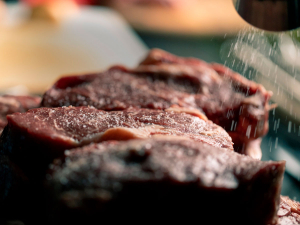Farmer confidence dips slightly, but positivity still dominates
Farmer confidence has taken a slight dip according to the final Rabobank rural confidence survey for the year.
 High prices and contracting production in the Northern Hemisphere are opposed by lower prices and increasing production in the Southern Hemisphere.
High prices and contracting production in the Northern Hemisphere are opposed by lower prices and increasing production in the Southern Hemisphere.
Global beef markets continue to be a story of two contrasting parts.
High prices and contracting production in the Northern Hemisphere are opposed by lower prices and increasing production in the Southern Hemisphere.
That's according to Rabobank's latest Beef Quarterly Report, which shows North American cattle prices continue to track at high levels, with steady US cattle prices and a 3% quarterly rise on Canadian prices.
Meanwhile, prices remain soft in Southern Hemisphere countries, with a dramatic 28% fall in quarterly Australian cattle prices.
Meanwhile, New Zealand and Brazil also saw prices fall, but by smaller amounts.
While Southern Hemisphere production continues to increase volumes, these have not been enough to offset the declines in Europe and the US.
Rabobank says global beef production is on track to decline by 1% in 2023 and 2024 production from major producing countries is expected to remain relatively constant to expected 2023 volumes.
The report also says while overall production and consumption in 2024 is expected to remain steady.
“The US will be one of the big movers. After shifting to a net-import position in 2023, we expect production to contract a further 4.5%, while consumption drops 3% in 2024, increasing the net-import position.”
“Australia and Mexico will be the major beneficiaries, with increases in production and exports expected for both countries. New Zealand, another large supplier to the US – particularly in lean trimmings – will also benefit, but restricted production and export growth will limit the gains.”
Rabobank expects the ongoing slow global economic recovery will limit consumers’ expenditure and likely curb their spending on beef next year, as any markets – particularly in Asian countries – did not experience the growth in consumption expected as economies recovered from Covid-19.
“Indications from China are that the type of products in demand is changing, with more attention being paid to value-for-money products and less to premium ones. This consumer caution may be supported initially by reduced volumes of more expensive North American beef and increased volumes of Australian and South American beef,” the report adds.
“However, when production in the US contracts to the point where it exerts upward price pressure on global beef prices, we may see some pushback from global beef consumers. It is possible that 2024 will see margins in beef supply chains being squeezed to manage higher prices and accommodate the consumer.”
According to the latest Fresh Produce Trend Report from United Fresh, 2026 will be a year where fruit and vegetables are shaped by cost pressures, rapid digital adoption, and a renewed focus on wellbeing at home.
The Roar is a highlight of the game hunting calendar in New Zealand, with thousands of hunters set to head for the hills to hunt male stags during March and April.
OPINION: The past few weeks have been tough on farms across the North Island: floods and storms have caused damage and disruption to families and businesses.
European dairy giant Arla Foods celebrated its 25th anniversary as a cross-border, farmer-owned co-operative with a solid half-year result.
The sale of Fonterra’s global consumer and related businesses is expected to be completed within two months.
Fonterra is boosting its butter production capacity to meet growing demand.

OPINION: Meanwhile, red blooded Northland politician Matua Shane Jones has provided one of the most telling quotes of the year…
OPINION: This old mutt has been around for a few years now and it seems these ‘once in 100-year’ weather…